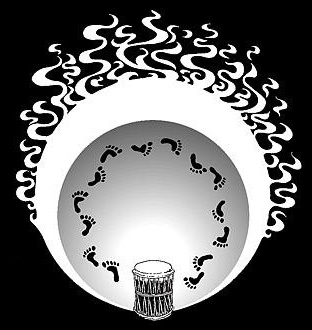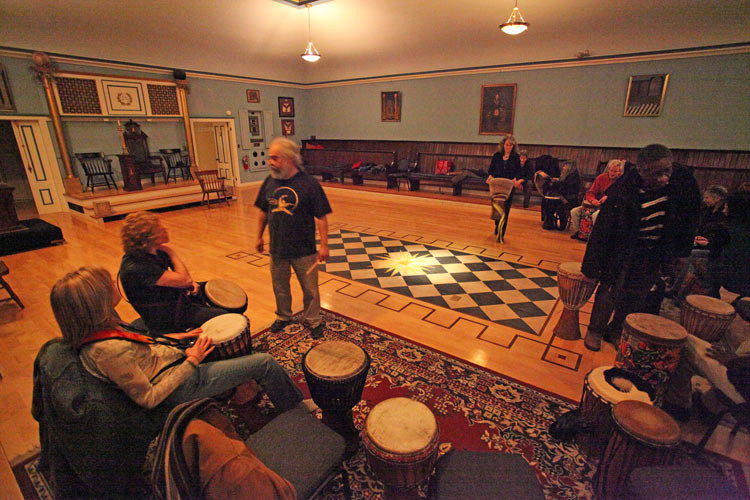GUIDELINES FOR DRUM COUNCIL
A drum council is a community cooperating together to make something greater than the sum of its parts. That's why there's more to a good drum council than expert drumming. In music, as with all forms of communication, the silence between the notes is as important as the notes themselves, and listening is as important as voicing.
If you are a novice drummer, watch the skilled drummers. If you cannot hear what they are doing, play more quietly. Use fewer notes rather than play every beat. Leave spaces in your playing so that other drummers will have space to play in. Using fewer notes will help you keep up speed with the other drummers and dancers, and also allows you to be more creative. It is all right to get lost. If you do, stop playing for a while, listen for the basic pulse, and join in with it. It is not necessary to play something entirely different from everybody else; try playing the same rhythm as other people at least part of the time. Repetition is an important and integral part of drumming. Use your eyes as well as your ears to understand what is happening. Pay attention, look and listen while you play.
If you are an experienced or lead drummer, be responsible. Listening is even more important when you are the glue holding the rhythm together. Be aware of the energy of the group. Add solos only when the existing rhythm is well established. If you are starting a new rhythm, choose one that others can easily join. Work with the whole group of drummers and dancers. Playing with a well rehearsed group is easy. Playing with a mixed crowd of novice and experienced drummers is more challenging, but it can bring out the best in everyone, and be a lot of fun.
Drums can be classified as having a tone which is low, middle, or high in range. If you sit close to other people who have drums that have a similar tone and volume to yours, it will help give the rhythms focus and cut down on distractions.
Be aware that bells, claves and shakers cut through the sound of all the other instruments. That is why they are the timekeepers and the key to most complex rhythms. These are sometimes called the "guideline" instruments, and they should hold to a steady part rather than "jam". If you are a novice drummer, it is good to learn the basic bell and clave parts if you can follow and learn from someone more experienced. Bells and claves can throw the whole group off if they are out of sync, so when in doubt go back to the basic pulse.
We are all teachers and learners. Don't hesitate to ask for help to figure out a rhythm, or to offer help to someone else.
It is customary to ask permission of a drum's owner before playing it -- but don't be afraid to ask! If you do not wish to have anyone else play your drum, please put it away or cover it when you are not using it. If you borrow someone else's drum, please observe the basics: remove rings before playing hand drums, and return the instrument to where you found it.
Please do not play melodic instruments like flutes and guitars at drum council. They confine the rhythm instruments to the span of their melody, and can be very distracting.
Do, however, feel free to express yourself with your voice. Chanting which blends with the rhythm can enhance the overall effect.
Most of all, have fun! Drumming and dancing are wonderful forms of creative self expression, and the drum council is a great place for us to express ourselves together.

